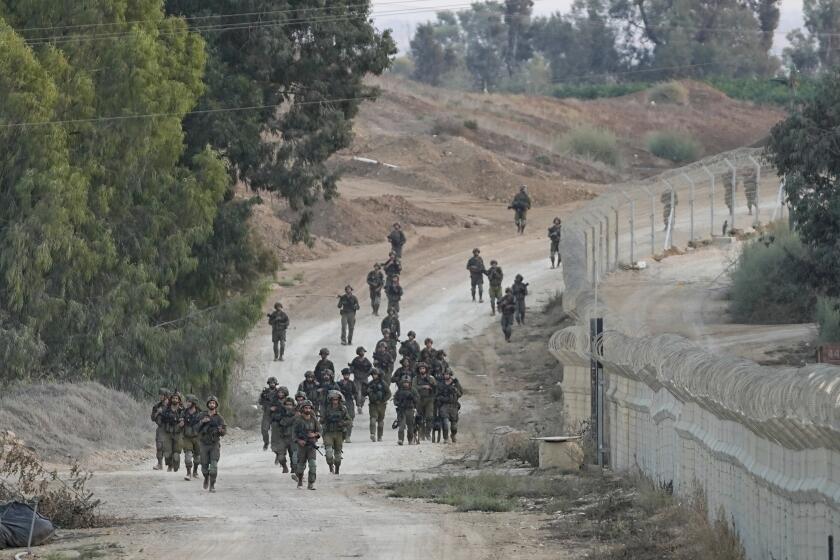Opinion: Why did Israel miss so many warnings of the Hamas attack? Here’s one answer

- Share via
More than a year before Hamas killed some 1,200 residents of Israel and kidnapped more than 200, Israeli intelligence officers reportedly learned about plans for the attack in extraordinary detail but couldn’t convince their leaders to take preventative action. How could a world-class security apparatus so badly underestimate one of its most dedicated adversaries?
As leaders become more insular and closed-minded, the quality of their information and decisions deteriorates. When security is on the line, the results can be tragic.
Benjamin Netanyahu’s secretive, ideologically rigid leadership style in that way helped undermine Israel’s security and imperil his people. He isn’t the first such world leader whose miscalculations led to such a disaster.
The terrorist ambush launched from Gaza reflected an operational failure on the part of the Jewish state: a basic misunderstanding of the nature of the enemy.
George W. Bush’s administration was another infamous example. His cadre of top advisors on national security, including Vice President Dick Cheney and Defense Secretary Donald Rumsfeld, believed the country’s priority was to counter threatening nation-states, by force if necessary. Although intelligence officials repeatedly briefed them and the president on the terrorist threats from a band of Islamic extremists known as Al Qaeda, the danger didn’t match their idea of a top national security concern. Bush therefore failed to order expanded intelligence sharing among agencies or take other steps that experts believe could have helped prevent 9/11.
The administration persisted in this misdirection even after the attack, which Cheney and other advisors treated as an opportunity to pursue their predetermined priorities. The vice president famously shuttled to Langley, Va., to strong-arm CIA analysts into producing reports that could suggest links between Al Qaeda and the troublesome regime in Iraq, leading to the disastrous invasion of that country.
When I joined the CIA in 2010, instructors stressed to my class of new analysts that we must collect differing views before finalizing analytic decisions. Groupthink in business can cost money, but groupthink in national security can cost lives. Agency veterans of the 9/11 era had recognized its follies and revamped the training in an effort to prevent similar intelligence failures in the future.
Israel’s quest to root out Hamas has inflicted indiscriminate death and destruction on Gaza and Palestinian civilians. Humanitarian pauses are no longer enough.
Netanyahu’s current administration in Israel is the most right-wing in his country’s history, populated with ideologues fixated on consolidating their power by expanding settlements in the West Bank. Bibi’s Minister of National Security, Itamar Ben-Gvir, is “widely known for racist, anti-Arab views,” as one academic analysis noted, and supports Zionist terror organizations. Finance Minister Bezalel Smotrich lives in a West Bank settlement deemed illegal under international law and has denied that Palestinians exist as a people. And Justice Minister Yariv Levin spearheaded a controversial attempt to prevent the judiciary from thwarting Netanyahu’s plan to nullify Palestinian autonomy.
Netanyahu and his deputies were committed to the idea that they could guarantee Israel’s security even as they squeezed Palestinians into ever smaller enclaves with receding hopes of anything approaching statehood. They certainly weren’t primed to consider a serious threat from Gaza when their government detected it last year.
Israeli officials obtained a document they called “Jericho Wall,” which outlined a Hamas assault with rockets, drones, paragliders and motorcycles targeting Israeli cities and bases around the Gaza Strip, the New York Times reported. But the military and intelligence leaders who saw the plan reportedly dismissed it as beyond Hamas’ capabilities.
By rewarding Israel’s far-right extremists and castigating the moderates, Prime Minister Benjamin Netanyahu believed that he had finally found the solution to the Middle East conflict.
Under Netanyahu, Israel’s intelligence agencies have tended to elevate reports that affirm his security credentials and suppress those that suggest weaknesses. The IDF’s Military Intelligence Directorate, Aman, also has too many analysts who are poorly integrated into the agency, preventing lower-level officers from “connecting dots,” according to Haifa University’s Uri Bar-Joseph.
In the months before the attack, the Israel Defense Forces grounded three large observation balloons surveilling Gaza due to bad weather but never returned them to service. Hours before the attack, Israel detected warnings that produced a flurry of concern, but the intelligence directorate’s commander, Maj. Gen. Aharon Haliva, announced no major deployments and continued his vacation on the coast.
When a crisis befalls a small circle of closed-minded leaders, they tend to react with strategic and often self-destructive recklessness. Like Bush after 9/11, Netanyahu has not only denied being warned about the attack but also launched a response that has brought international condemnation.
Hard-headed governments regularly miscalculate the risks of their most provocative acts. In February 2022, Vladimir Putin decided — probably on his own — to invade Ukraine, an operation he assumed would take 10 days, according to research by the Royal United Services Institute, a British security think tank. Almost two years later, nearly half a million troops from both sides are dead or injured, over 11 million people are displaced and the International Criminal Court has issued a warrant for Putin’s arrest.
The modern U.S. national security apparatus is sluggish and imperfect, but it does take pains to collect vast arrays of input from intelligence assets, analysts, generals, think tanks, congressional committees and Cabinet officials. I spent hundreds of hours in conference rooms with colleagues debating the meaning of reports and their associated threat levels, leaving no unpopular perspective overlooked before sending an analysis to a superior. My fellow analysts and I had the autonomy to identify threats and interpret them in our own words.
Authoritarian leaders who brook no dissent, by contrast, often make world-changing decisions for the worse. Netanyahu’s mismanagement of his country’s security could shove his people into a multifront regional war and lead to his ouster.
The international community and particularly the United States could have acted to rein in his authoritarianism years ago and pressured him toward a less catastrophic outcome. Instead we’re contending with the fallout of another strongman’s disastrous misapprehension of his enemies.
Brent Giannotta is a writer based in Los Angeles and a former CIA political analyst.
More to Read
A cure for the common opinion
Get thought-provoking perspectives with our weekly newsletter.
You may occasionally receive promotional content from the Los Angeles Times.













